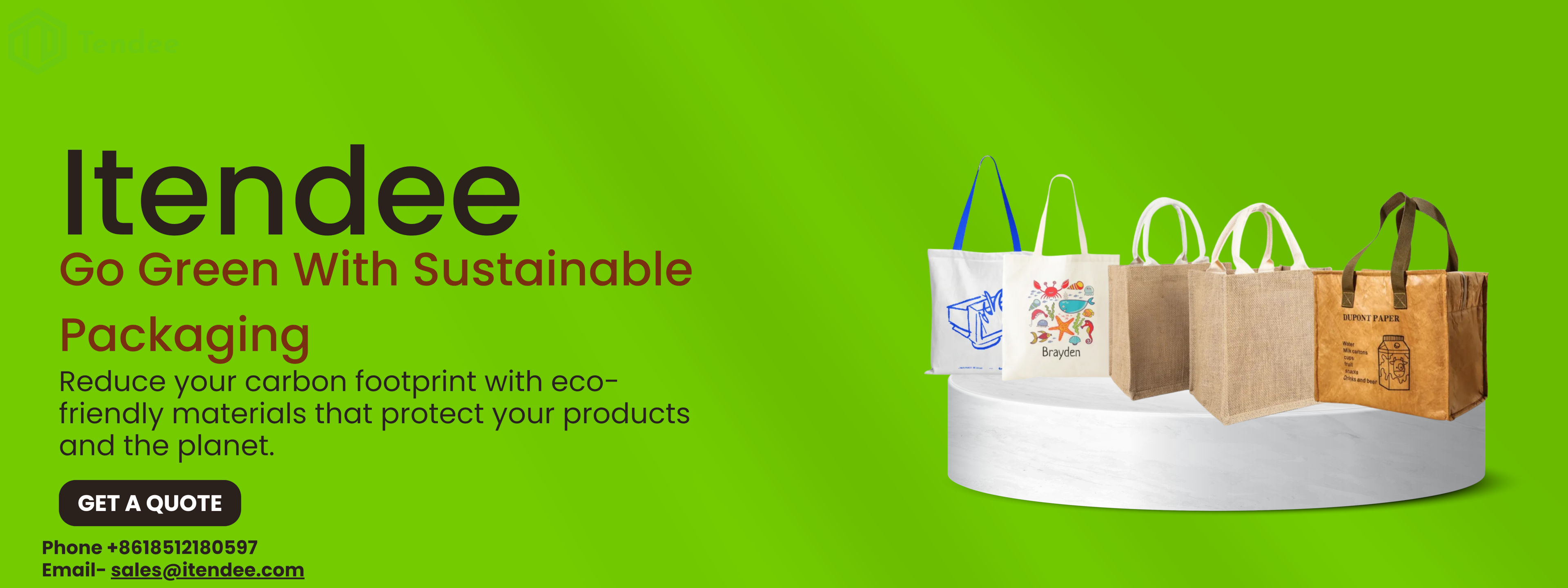Plastic bags are disappearing fast. More than 127 countries have either banned or taxed single-use plastics (UNEP, 2022). This global shift is forcing businesses to rethink how they package everyday goods.
Consumers are also demanding better options. Around 500 billion plastic bags are used worldwide each year, but most are discarded after one use (UN Environment Programme). By contrast, a single reusable grocery bag can replace 125–150 disposable bags over its lifetime.
For supermarkets, retailers, and wholesalers, this change isn’t just about compliance. It’s about meeting customer expectations with durable, eco-friendly bags that reflect a brand’s values. And the benefits go well beyond the environment, adopting reusable bags can also strengthen regulations compliance and improve brand reputation.
The Case for Switching to Reusable Grocery Bags
Switching to reusable grocery bags is more than just a trend. It is becoming a business necessity driven by environmental concerns, government action, and changing consumer behavior. Let’s look at why the shift makes sense for both the planet and your brand.
Environmental Benefits
Plastic waste is one of the biggest global challenges. Every year, over 8 million tons of plastic end up in the oceans (National Geographic). A major share comes from single-use plastic bags. Switching to reusable grocery bags directly reduces this waste. One durable bag, used consistently, can cut down hundreds of disposables. This means fewer landfills, cleaner cities, and a lower carbon footprint for businesses.
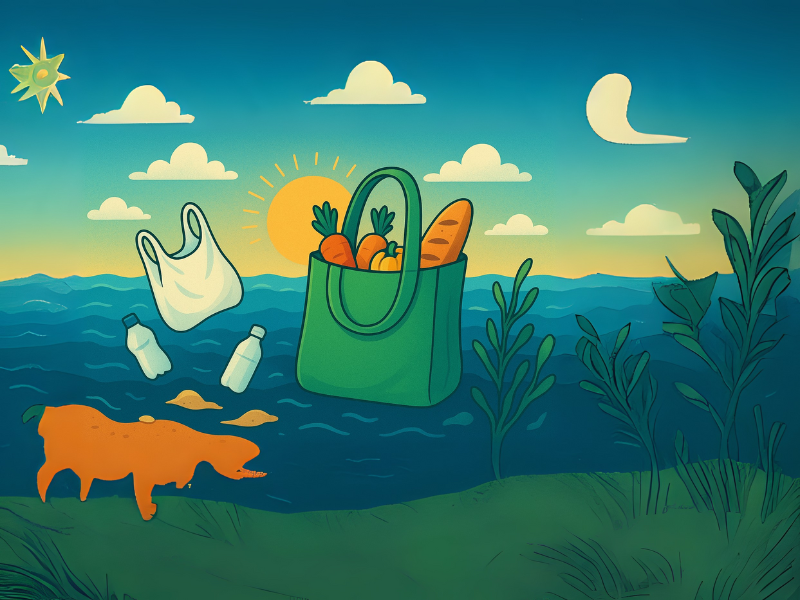
Regulatory Trends
Governments are stepping in to control plastic pollution. By 2023, more than 127 countries had regulations on plastic bags, ranging from taxes to complete bans (UNEP). Retailers and supermarkets that shift early to reusable bags stay ahead of these rules. It reduces compliance risks and shows readiness for future regulations.
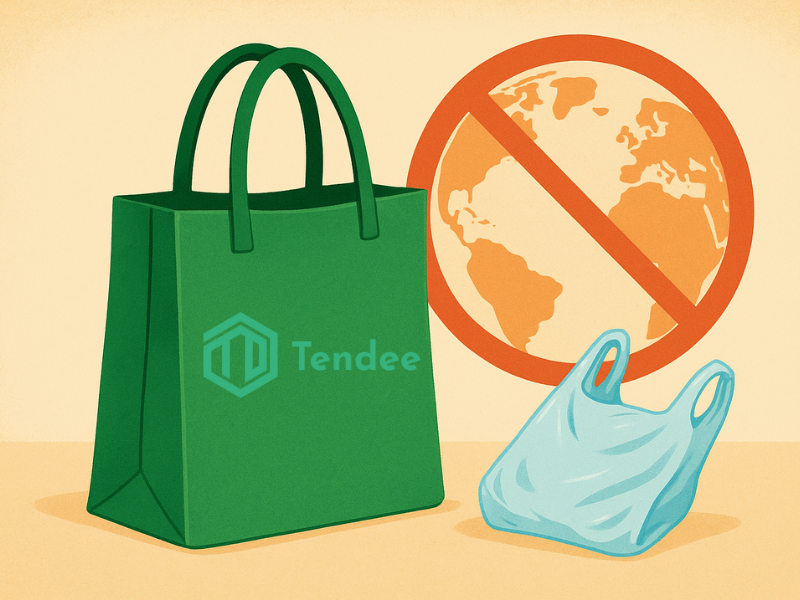
Positive Brand Image
Sustainability is now part of customer expectations. Studies show that 73% of global consumers are willing to change their habits to reduce environmental impact (NielsenIQ, 2025). Businesses that offer eco-friendly grocery bags are seen as responsible and forward-thinking. It builds trust, strengthens loyalty, and turns packaging into a positive brand statement.
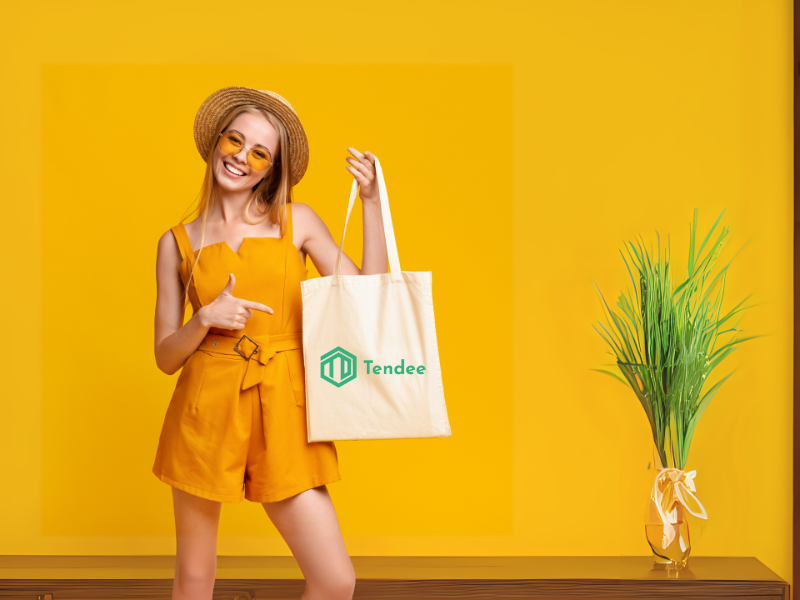
Material Options for Reusable Grocery Bags
Choosing the right material for a reusable grocery bag is not just about cost. It also shapes how durable the bag will be, how it feels to customers, and what it says about your brand. Below are the most widely used options explained in detail.
Recycled Materials
One of the most popular choices for businesses today is recycled fabric. rPET, made from recycled plastic bottles, is lightweight yet strong enough to handle daily grocery use. Because it is water-resistant and easy to clean, it works well for supermarkets and wholesale buyers who need bags that can last for months. However, as it is still petroleum-based, it does not offer the same “natural” appeal as organic fibers, though it supports the recycling loop.
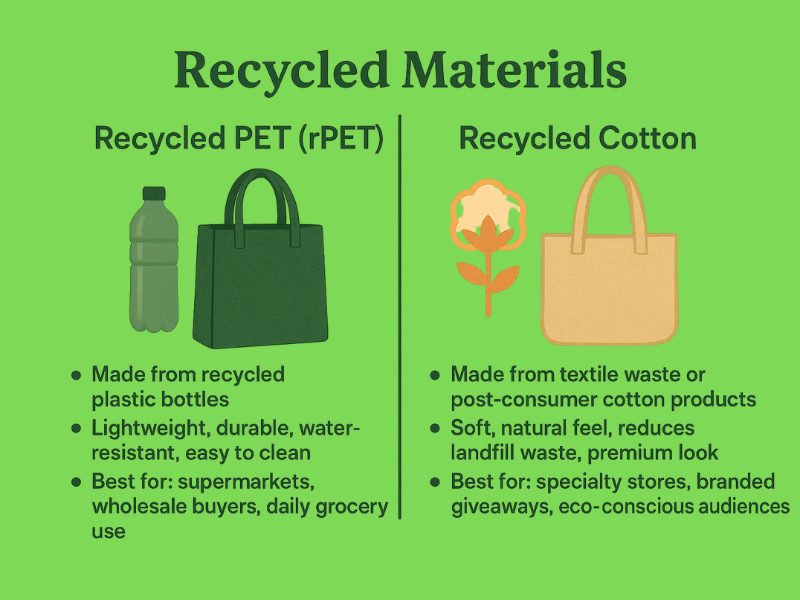
Another growing option is recycled cotton, which comes from textile waste or post-consumer cotton products. It offers the same soft, natural feel as new cotton but reduces landfill waste by giving old fabric a new life. For businesses, recycled cotton is a premium choice because it combines sustainability with a high-end look. The trade-off is that it may not be as durable as virgin cotton and often costs more, making it more suitable for specialty stores or branded giveaways rather than everyday bulk retail.
Natural Fibers
Cotton has long been a favorite for tote bags and retail packaging. It is soft, washable, and offers endless customization options for branding. Businesses can screen-print, embroider, or dye cotton bags to match their identity, making them a versatile choice for retailers. The challenge with cotton is the environmental impact during cultivation, especially the water required to grow the crop. This makes organic cotton or recycled cotton more attractive alternatives for businesses committed to sustainability.
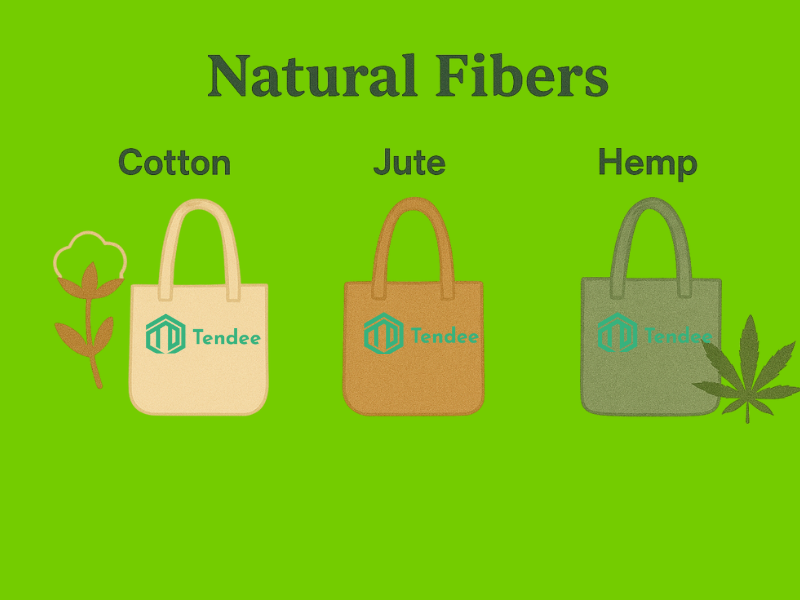
Jute, often called the “golden fiber,” is valued for its coarse texture and natural strength. It is highly durable and fully biodegradable, which makes it an excellent option for grocery stores that want heavy-duty bags with a rustic look. The main limitation of jute is that it does not allow as much design flexibility as cotton, it is harder to dye or print in complex colors. Still, for wholesalers and supermarkets, jute is a cost-effective way to provide long-lasting bags that stand up to heavy loads.
Hemp is another natural fiber gaining popularity due to its sustainability profile. It requires little water or pesticides to grow and produces fibers that are stronger than cotton. Hemp bags can last for years, making them ideal for businesses that want to promote long-term reuse. The drawback is cost, hemp is less common in global supply chains, so businesses may pay more compared to cotton or jute.
Durable Synthetics
For businesses that prioritize low cost and mass production, synthetic options are often the go-to. Non-woven polypropylene (PP) is one of the most widely used materials in grocery bags today. It is lightweight, inexpensive, and easy to print, making it a favorite for supermarkets and promotional campaigns. Although it is not biodegradable, it can be reused many times and recycled at the end of its life, offering a practical alternative to single-use plastics.
Nylon is another synthetic option, known for its flexibility and strength. It is often used in foldable bags because it can be compressed into a small pouch while still being capable of carrying heavy loads. For businesses, nylon works best when the bag itself is sold as a reusable product, rather than given away. The higher cost compared to polypropylene makes it less attractive for bulk, free distribution, but it delivers excellent durability for long-term use.
Each material has unique strengths and trade-offs. Some, like polypropylene, are designed for affordability and bulk use, while others, like hemp or recycled cotton, position a business as eco-forward and premium. The best choice depends on whether your priority is price, durability, or brand image
Choosing the Right Reusable Bag for Your Business
Selecting the right reusable grocery bag is not only about material. The size, handle design, and customization features play a major role in how useful the bag will be for customers and how well it represents your brand. Making the right choices ensures your investment delivers long-term value.
Bag Size and Weight Capacity
The size of a bag should match the type of products your store sells. Grocery stores often require medium to large bags that can accommodate multiple heavy items, such as bottles, vegetables, or packaged goods. In contrast, boutiques or jewelry shops may require smaller bags that focus more on presentation than load capacity.
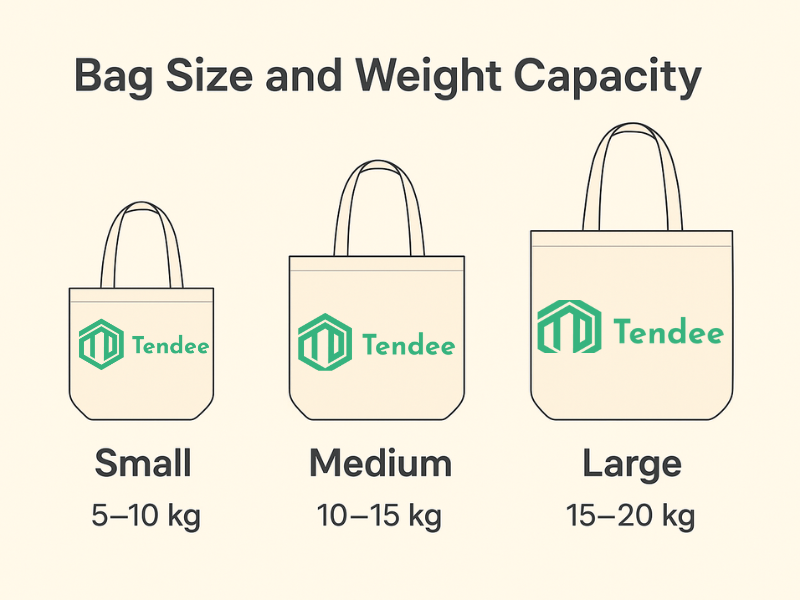
Weight capacity is equally important; strong seams and reinforced bottoms help bags withstand loads of 10–15 kg without tearing. Choosing the right size and strength ensures customers reuse the bag multiple times, giving your brand repeated visibility.
Handle Length and Comfort
Handles directly affect how customers use and perceive a bag. Short handles are common in grocery bags designed for quick lifting and placing in a car, while long handles allow customers to carry bags over their shoulders, making them more convenient for longer trips.
Comfort also matters; cotton or padded handles feel softer in the hand compared to thin synthetic straps. For businesses, offering the right handle length improves customer satisfaction and increases the chances of long-term reuse.
Customization for Branding
Reusable bags are not just packaging, they are moving advertisements. Customization allows businesses to place their logos, slogans, or artwork directly on the bag. Options include:
- Screen Printing: Cost-effective and suitable for bold, simple designs.
- Embroidery: Adds a premium, durable touch, often used on cotton or jute bags.
- Heat Transfer or Digital Printing: Allows full-color designs, ideal for businesses wanting high visual impact.
By customizing bags, businesses can turn every shopping trip into a branding opportunity. The more attractive and durable the design, the more likely customers are to reuse the bag in public, increasing brand exposure.
Business Takeaway
The right combination of size, handle design, and branding makes a reusable bag not just practical but also memorable. For businesses, this means choosing a design that balances customer comfort with promotional value.
At Itendee, we help companies design and produce bags that fit their exact business needs, whether it’s tote bags for retail, drawstring bags for events, or durable grocery bags for supermarkets.
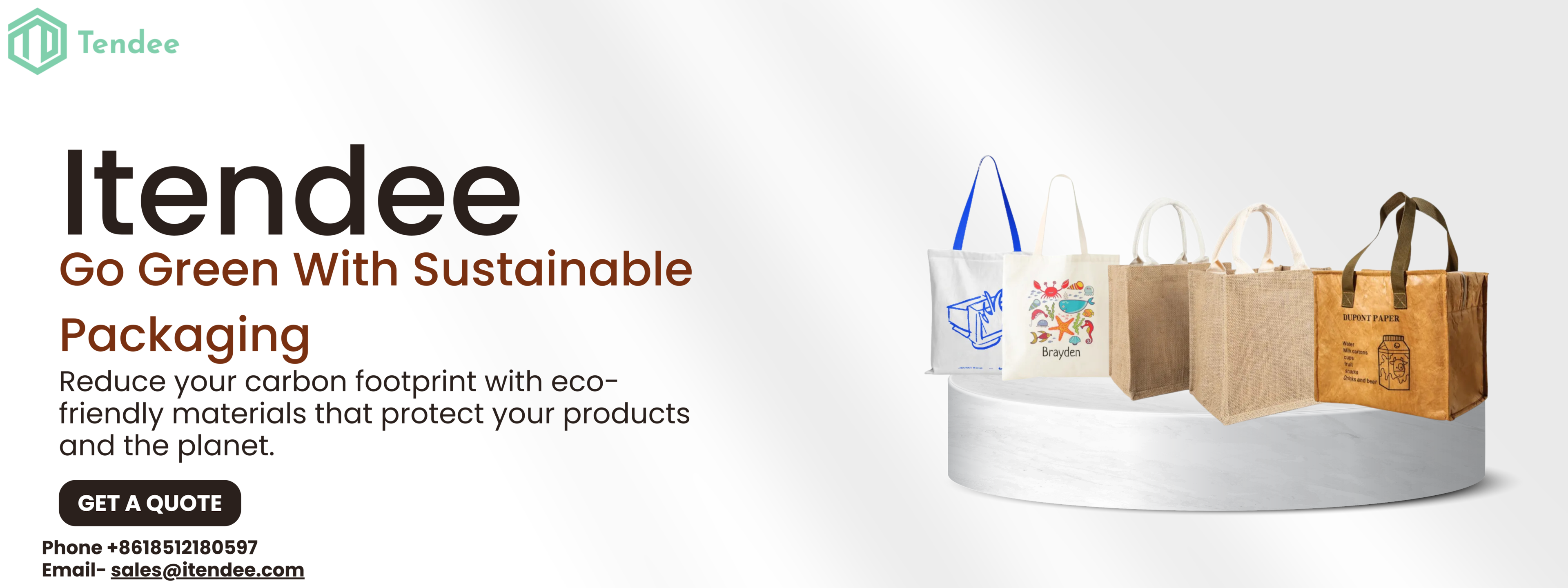
How to Source Reusable Grocery Bags in Bulk
Once you know the type of reusable grocery bag your business needs, the next step is sourcing. Buying in bulk requires careful planning to balance cost, quality, and supply reliability. Below are the key factors businesses should consider.
Finding Reliable Manufacturers
The first step is to partner with a trusted supplier. A reliable manufacturer ensures consistent quality and timely delivery, which is crucial when bags are ordered for retail chains or large-scale events. Look for suppliers with proven experience in producing recycled, reusable grocery bags or natural fiber bags at scale.
Request product samples before committing, and check customer reviews or case studies to confirm reliability. Strong suppliers also offer flexibility in customization, allowing your brand identity to be printed or embroidered without compromising durability.
Evaluating Minimum Order Quantities (MOQs)
Every manufacturer sets a minimum order quantity (MOQ), the smallest number of bags you must purchase in one order. MOQs can range from 500 to 5,000 bags, depending on the material and customization required. For smaller businesses, a lower MOQ allows testing demand before committing to large volumes. Larger retailers, on the other hand, can take advantage of higher MOQs to reduce unit costs. Understanding MOQs upfront helps avoid over-ordering or stretching your budget too thin.
Price Points and Economies of Scale
Bulk sourcing lowers the price per unit; however, costs vary based on material, size, and customization requirements. For example, non-woven polypropylene bags may cost significantly less than cotton or hemp bags, making them a more attractive option for high-volume supermarket orders.
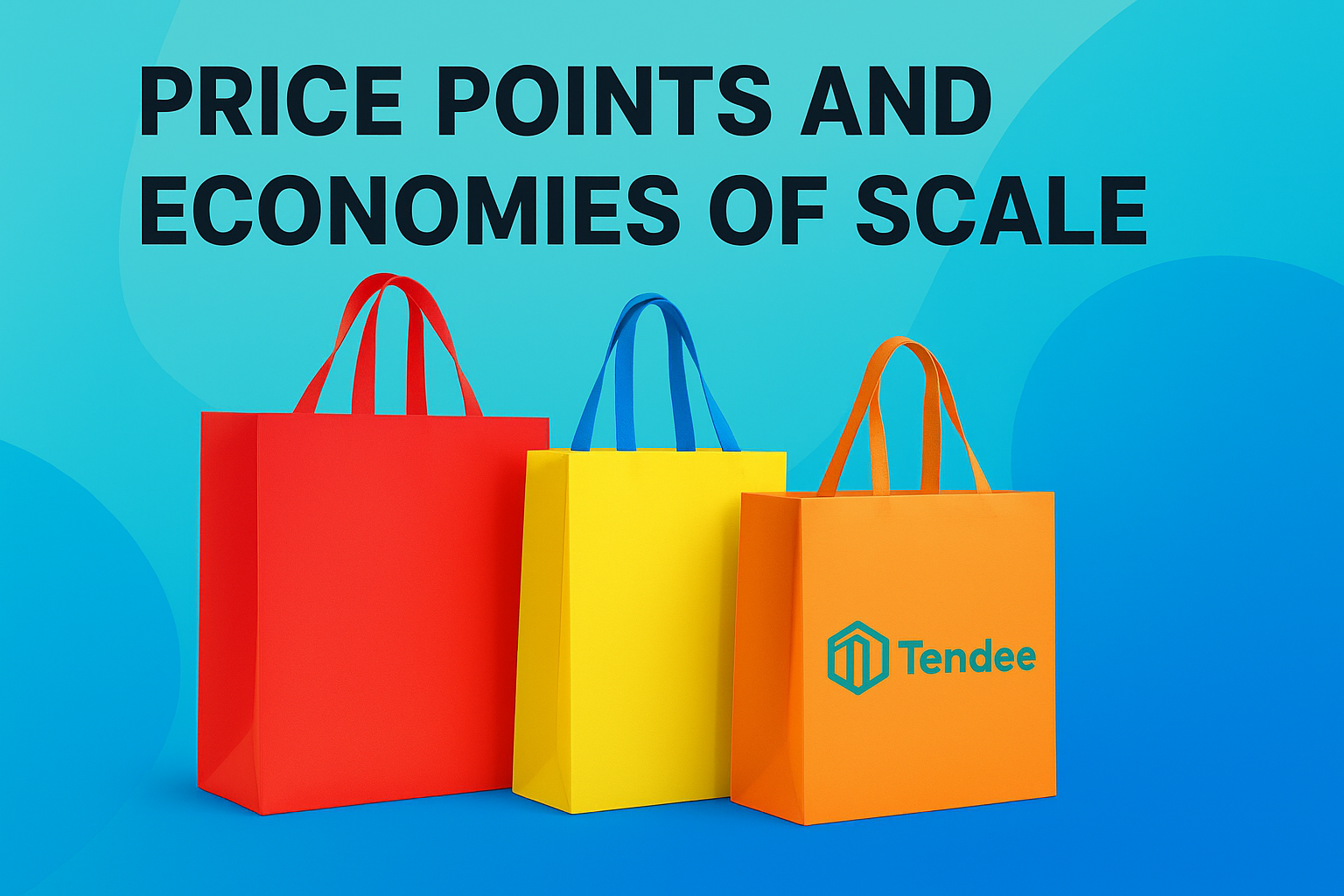
Adding custom prints or embroidery increases the price but boosts brand value. The key advantage of bulk sourcing is economies of scale: the more you order, the lower the cost per bag. For businesses, this means planning, ordering seasonal or yearly supplies in larger batches can deliver major cost savings.
Bulk sourcing is not only about getting the lowest price; it’s about ensuring quality, durability, and brand consistency. Partnering with the right supplier can help businesses secure long-term savings while offering customers bags they want to reuse.
At Itendee, we specialize in bulk orders of tote bags, grocery bags, and other custom packaging solutions, helping retailers, wholesalers, and event organizers get the best balance between cost, durability, and design.
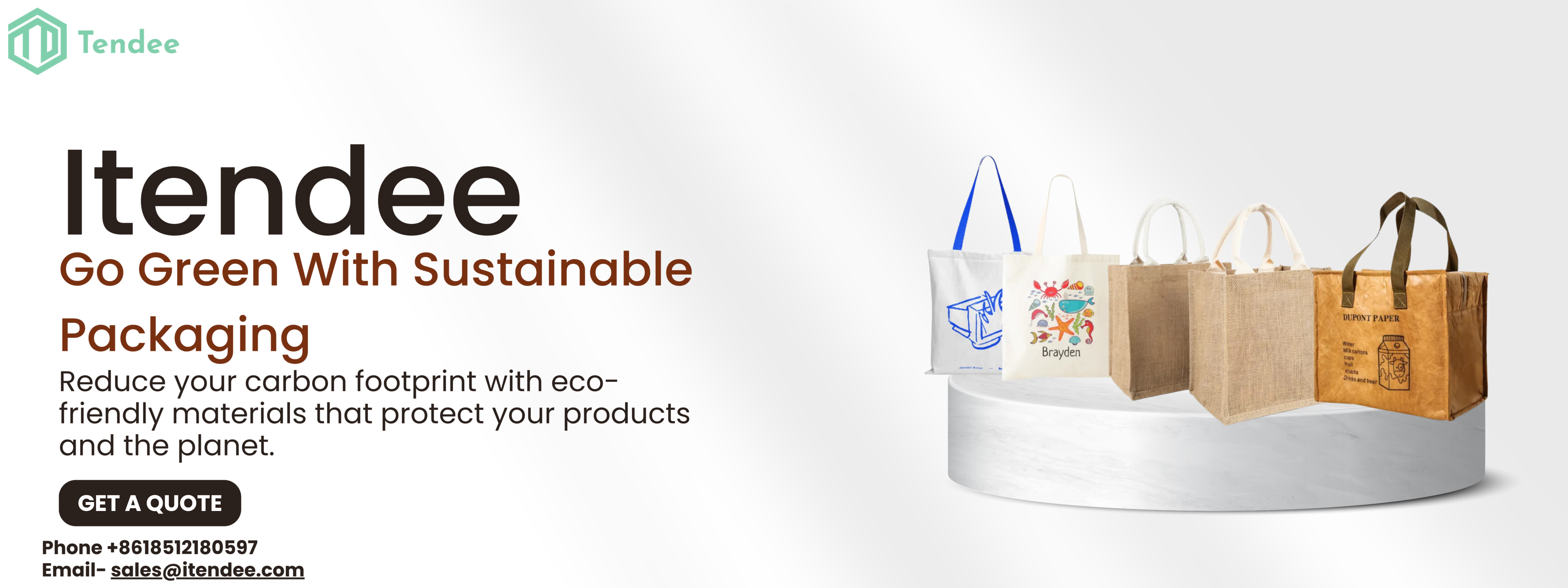
Tips for Encouraging Customer Adoption
Switching to reusable grocery bags isn’t just about stocking them on shelves—it’s about motivating customers to choose them over single-use plastics. Businesses can boost adoption through incentives, education, and creative designs that make sustainability appealing.
Incentive Programs
Offering small rewards is one of the most effective ways to encourage customers to bring their own bags. For example:
- Supermarkets can provide a small discount per transaction when customers use reusable bags.
- Specialty stores can introduce a loyalty card system, where consistent bag use leads to discounts or free products.
- Retail chains can offer exclusive perks or early access to promotions for customers who regularly opt for reusable bags.
These programs make customers feel rewarded while reinforcing sustainable shopping habits.
In-Store Displays and Education Campaigns
Visibility is crucial, most customers make quick decisions at checkout. To increase adoption:
- Place reusable grocery bags at checkout counters and entrances for convenience.
- Add educational signage showing how many plastic bags can be saved by switching to reusable alternatives.
- Use digital and social media campaigns to spread awareness and align with in-store promotions.
By combining convenience with education, businesses help customers see the value of reusable bags instantly.
Limited-Edition or Seasonal Designs
Reusable bags can also serve as a branding opportunity. Offering special designs creates excitement and encourages repeat purchases. For example:
- Grocery stores can launch holiday-themed or seasonal collections.
- Retailers can collaborate with local artists to design exclusive reusable bags.
- Businesses can create branded reusable bags that double as stylish accessories.
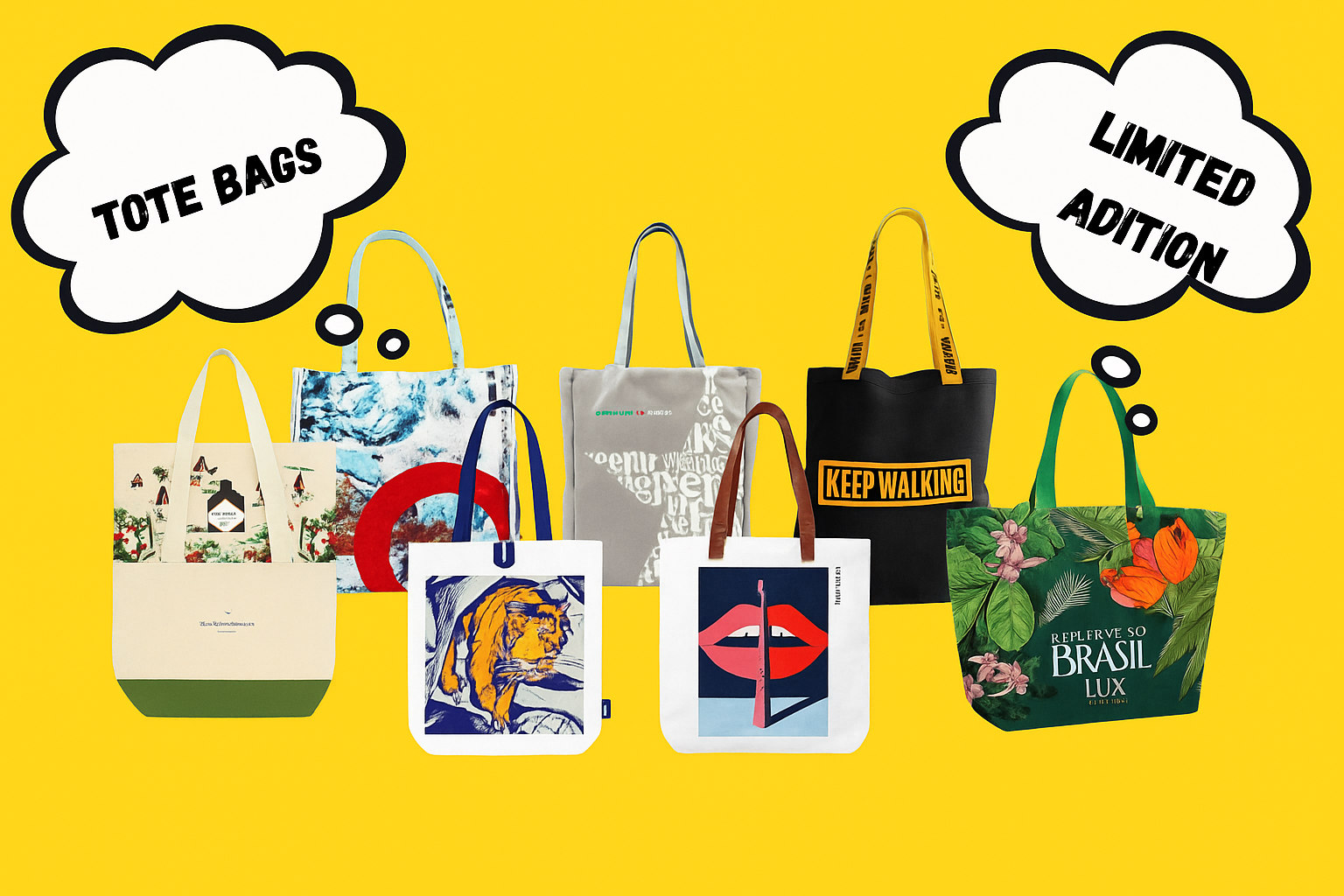
This turns a simple bag into a loyalty-building marketing tool, keeping customers engaged and spreading brand visibility long after purchase.
At Itendee, we help businesses design and supply branded reusable bags that customers want to use, from tote bags and drawstring bags to seasonal designs tailored for your brand.
FAQs — B2B Reusable Bag Sourcing & Branding
What’s the average lifespan of a reusable grocery bag?
Most high-quality reusable grocery bags last 2–5 years, depending on the material and frequency of use. With proper care, cotton and recycled fabric bags can withstand hundreds of uses, making them a cost-effective alternative to single-use plastics.
Which materials are most durable for heavy retail use?
- Non-woven polypropylene (PP) — lightweight, affordable, and long-lasting.
- Cotton canvas — strong, washable, and suitable for premium branding.
- Recycled PET (rPET) — made from recycled bottles, offering excellent durability and water resistance.
How many washes can a cotton or recycled bag handle?
Cotton tote bags can endure 50+ washes without losing strength, while recycled PET bags can typically withstand 20–30 washes. Washing in cold water and air-drying extends the bag’s lifespan.
Can reusable grocery bags be printed with full-color designs?
Yes. Businesses can choose from screen printing, heat transfer, sublimation, and embroidery. Full-color, high-resolution branding is possible, making reusable bags an effective marketing tool.
What’s the best bag option for a supermarket chain?
Supermarkets usually benefit from non-woven polypropylene or rPET bags due to their balance of cost-efficiency, durability, and branding flexibility. Offering a mix of budget-friendly grocery totes and premium cotton options ensures appeal across all customer segments.
Final Thoughts
The move from single-use plastics to recycled, reusable grocery bags is no longer optional, it’s the future of retail packaging. Businesses that adopt durable, eco-friendly bags not only reduce environmental impact but also stay compliant with evolving regulations and strengthen their brand reputation. With the right material, size, and customization, these bags transform from simple packaging into a long-term marketing asset that customers proudly reuse.
Conclusion
At Itendee, we specialize in helping supermarkets, retailers, and event organizers make the switch from single-use plastics to durable, branded reusable bags.
- Custom printing options to showcase your brand.
- Wide range of styles of tote bags, drawstring bags, die cut bags, paper bags, mailer bags, and more.
- Bulk pricing designed for B2B orders.
Partner with us today to supply eco-friendly grocery bags that not only carry products but also carry your brand message, while protecting the planet.
